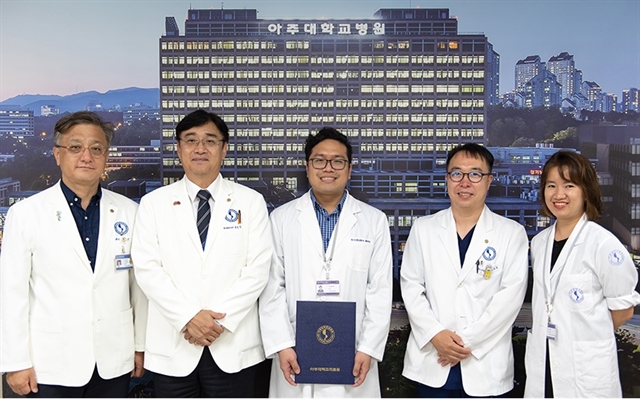 Society
Society

 |
| Dr. Nguyen Van Hung, 33, a visiting professor of radiology at the Hanoi Medical University Hospital in Hanoi, Vietnam, poses for photo on May 12, 2024. — Photo Yonhap |
HÀ NỘI — "Owing to the medical training in Korea, I've grown into a more qualified doctor, and now I have been making the most of the advanced medical technologies I learned in Korea to cure Vietnamese patients."
Dr. Nguyen Van Hung, 33, a visiting professor of radiology at the Hanoi Medical University Hospital in Hanoi, Vietnam, told Yonhap News Agency on May 12 (local time) about his medical training experience at Ajou Medical University Hospital in Suwon, South Korea.
Dr. Hung was selected as one of trainees to join the medical training project for Vietnamese medical workers co-organised by the Daewoo Foundation and Ajou Medical University Hospital, and has had medical training in Korea for half a year since April last year.
Launched in 2009, the programme selects doctors, nurses and other medical professionals, and provides them with medical training in Korea for six months to one year to eventually contribute to the medical developments in Vietnam. Selected trainees receive the whole financial support for their training, including accommodation, meals and living expenses in Korea.
Dr. Hung is a cancer treatment expert who has been working as a visiting professor at Hanoi Medical University Hospital since 2020. Though he was already a creditable medical specialist, medical training in Korea was an invaluable opportunity to learn new medical knowledge he needed and enhance his skills, he said.
 |
| Vietnamese medical trainees and officials of Ajou Medical University Hospital pose for photos on May 12, 2024. — Photo of Ajou Medical University Hospital |
During his training, Dr. Hung took apprenticeship training in the Department of Radiation Oncology, following professors all day long, observing all processes, such as treatments and attending meetings.
The first benefit was that he was able to see and learn about radiation therapy equipment, and related technologies that had not been introduced in Vietnam, such as the latest linear accelerator (LINAC) and hyper-arc.
"HyperArc, a state-of-the-art device, can be applied to cases that cannot be treated by Gamma Knife, a radiation therapy device widely used in Vietnam," said Dr. Hong. "It was very great to see these new technologies already in use at Ajou Medical University Hospital." He was also deeply impressed by enthusiastic senior professors at Ajou who had devoted themselves to teaching foreign trainees, such as Professor Emeritus of Radiation Oncology Dr. Jeon Mi-Sun (68).
"I felt that I still had a lot to learn from them, and their way of communication and interaction with patients was very impressive, which I am now applying to my work," Dr. Hong added.
He also emphasised that "there were cases where professors had different views on the same patient case, but instead of sticking to their own views stubbornly, they listened to others' opinions with a humble attitude and tried different things to find the best way. All these processes taught me how to work scientifically."
Dr. Hong said that, while living in an unfamiliar foreign country, he was able to commit himself to his studies in a stable environment, thanks to the provision of accommodations and meals, living expenses, and the kindness of Korean people, including hospital staff members.
"My training in Korea has been an invaluable experience for me," Dr. Hung said. "And I'd like to express my sincere gratitude to the Daewoo Foundation, professors of Ajou Medical University Hospital, and hospital officials for giving such a great opportunity to me and many other Vietnamese doctors."
Vietnamese medical trainees and officials of Ajou Medical University Hospital pose for photos on May 12, 2024. [provided by the Ajou Medical University Hospital]
Like Dr. Hung, a total of 93 Vietnamese medical workers including 67 doctors, 24 nurses and 2 medical technicians have benefited from this training programme over the past 15 years.
The programme was initiated by the proposal of the late Chairman Kim Woo-joong, founder of the Daewoo Foundation. Chairman Kim, who had a deep relationship with Vietnam, entered upon this program, recognising the importance of fostering talents for the development of the country's medical system, which was still less advanced at the time.
Under the medical training program, Vietnamese doctors have had training in various departments, including internal medicine, surgery, neurosurgery, and cardiovascular and thoracic surgery, and learned advanced techniques, such as cancer surgery, hematopoietic stem cell transplantation, vascular interventional procedures, reconstructive operation and so on.
They also got the chance to participate in various activities, like medical volunteer programs in Korea organised by the medical services club of Ajou Medical University Hospital.
Daewoo Foundation and Ajou Medical University Hospital estimated that Vietnamese trainees have applied medical skills they learned in Korea to enhance patient care and played a meaningful role in the Vietnamese medical community.
"As the programme has continued for 15 years, not a one-time event, it has received a good response among hospitals in Vietnam, and more and more capable medical staff have applied for the program," Choi Yoon-kwon, Secretary General of the Daewoo Foundation, said.
"In the past, Korean doctors have learned advanced medical technologies from global medical powerhouses, and now our nation has also grown into a world-class medical powerhouse," he said, adding, "We hope that Vietnamese doctors will contribute significantly to the development of their nation's medical services through this project."
In addition, Daewoo Foundation and Aju Medical University Hospital have also engaged in a variety of other activities, including medical volunteer services in Vietnam, and medical services and medical expense support for foreign workers in Korea. — YONHAP